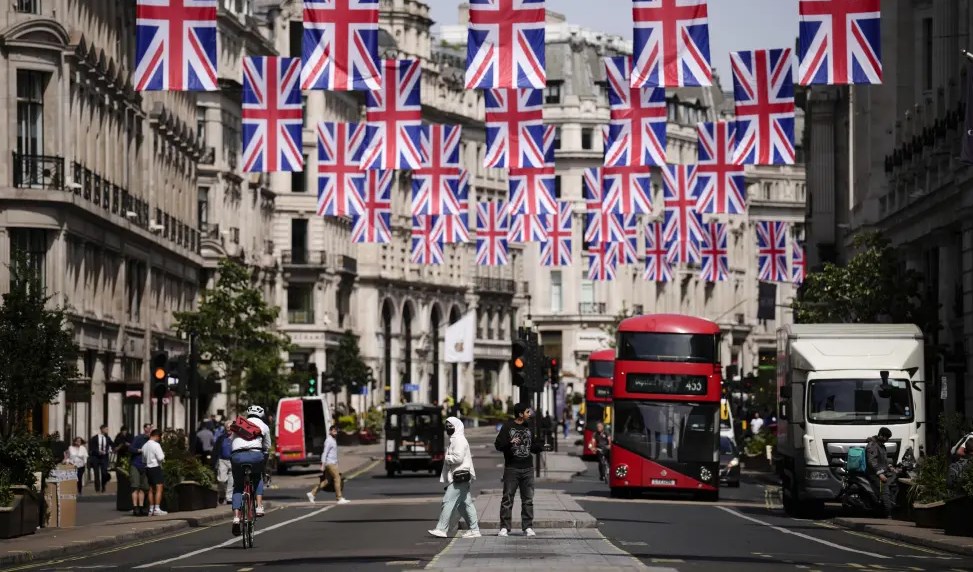The UK is now a poor nation, poorer than the US: Report
The average American is 39% richer and 38% more productive than the average Brit. Meanwhile, housing is also cheaper in the US, and the same goes for energy even before the war in Ukraine.
-

People cross the Regent Street shopping district with Union flags hanging over it to mark the upcoming Platinum Jubilee of the 70 year reign of Britain’s Queen Elizabeth II, in London, Wednesday, May 18, 2022. (AP)
The UK is considered to have some of the lowest productivity in the West, and merely opening a bank account in the UK has become such a hassle. But why hasn't the reason been questioned? With UK companies relocating business to the Gulf or to Europe, especially after the Brexit shenanigan, shouldn't we ask why the UK is slowly becoming a poor nation?
Since Brexit took over, bureaucracy has ballooned and the economy is slowly but surely degrading, and the UK's problem is that it keeps refusing to acknowledge it.
According to author Daniel Hannan for The Telegraph, the UK keeps convincing itself that it's still a rich country and that the right-wing does it out of "patriotic boosterism" while the left does it "as a pitch for more spending."
The average American is 39% richer and 38% more productive than the average Brit. Meanwhile, housing is also cheaper in the US, and the same goes for energy even before the war in Ukraine.
Read next: UK food prices up by as much as 175%
Hannan states that when friend Douglas Carswell, the former Conservative and Ukip MP, emigrated to the US state of Mississippi, which he picked because it ranked 50th out of 50 states, he believed if school choices and tax cuts could be made to work in Mississippi, then all was good. However, he found that he was entering a higher standard of living than what he had left behind.
“A teacher or a registered nurse here starts on maybe £41,000 ($52,640)”, says Carswell to Hannan. On the other hand, in the UK, outside London, a teacher gets around paid £30,000 ($38,500), and a nurse £25,000 ($32,000).
“The superintendent of a typical school district in Mississippi takes home £130,000 ($167,000) a year, similar to a Cabinet minister,” says Carswell. “I know landscape gardeners who make more than the hedge-fund managers I knew in west London”.
Economist Sam Bowman states: “Americans could stop working each year on September 22 and still be richer than Britons working for the whole year.”
As living costs in the UK skyrocket, young adults face increasing exploitation risks. A new poll which was launched by the UK's largest children's charity, Barnardo's, earlier this month showed that six in ten parents will face challenges in affording to register their children in clubs and activities, taking time off work, and even going on family outings.
Money in a poor nation's world
The Bank of England, ever since March 2009, has hiked the amount of money in circulation by about 50%, as the currency debasement accelerated through the country's Covid lockdown. Meanwhile, government spending and borrowing skyrocketed and no political party proposed to go back to January 2020 levels.
This month, borrowing costs in the UK hit a 2008-financial-crisis high as the country's economy struggles to push back skyrocketing inflation amid continued hikes in interest rates.
House prices have increased by 450% in real terms since 1971, which according to the author is a figure no other OECD country comes near to, while expensive property very well increases the cost of every other thing.
The proportion of day-to-day government spending solely dedicated to the National Health Service (NHS) rose from 27% in 2000 to 44% this year and will soon surpass 50%, as former Secretary of Health and MP Sajid Javid points out. The term that Britain is a health bureaucracy with a government attached is becoming true in the literal sense. The NHS not only absorbs resources but by producing worse outcomes, it keeps more Brits off work.
Read more: UK Bank apologizes to Brexit figure Nigel Farage over account closure
It turns out that cheaper child care was not the aim, nor oil and gas drilling, lower stamp duty, or an end to the IR35 rules that punish the self-employed. The goal wasn't to attract top-rate taxpayers either, which are the people who pay most to the British state and claim the least from it.
Conservative MPs were aware that slashing top-rate tax would hone in more revenue, but they resisted what they referred to as the “optics”. However, leftist governments can cut down on entitlements without being accused of murdering the poor.
For instance, this report by Hannan uses Sir Keir Starmer as an example of someone who could get away with things that no Conservative MP would dare come close to. Starmer could bring the NHS to conform with European healthcare systems, where public and private providers coexist, or he could remove the triple lock on pensions, and even let the pension age increase with longevity. Building more houses and tackling what is misleadingly called green belts (a planning strategy that keeps land permanently open to control urban growth and development) is something that Starmer could also do.

 5 Min Read
5 Min Read








